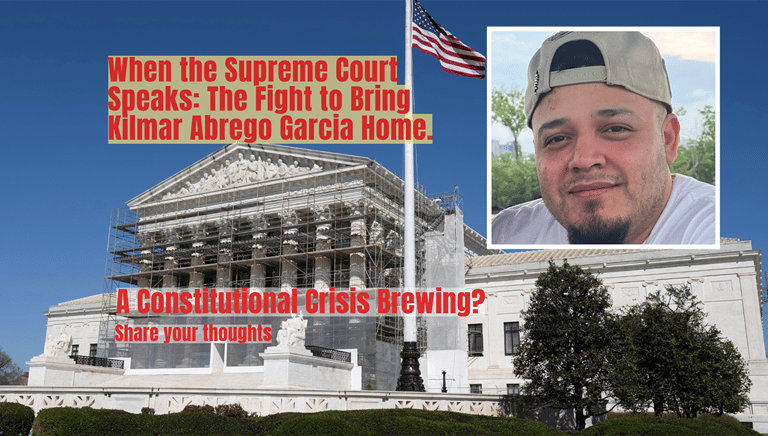When the Supreme Court Speaks: The Fight to Bring Kilmar Abrego Garcia Home
4/22/20254 min read


When the Supreme Court Speaks: The Fight to Bring Kilmar Abrego Garcia Home
Imagine living in the United States for 15 years, legally, with a work permit, only to be abruptly deported to a notorious prison in El Salvador—despite a court order protecting you. This isn’t a dystopian novel; it’s the real-life story of Kilmar Abrego Garcia, a Salvadoran man at the heart of a legal firestorm that’s pitting the U.S. Supreme Court against the Trump administration. On April 11, 2025, a unanimous 9-0 Supreme Court decision sent shockwaves through the nation, exposing the dangerous overreach of immigration policies—and the human cost of getting it wrong.
A Wrongful Deportation Sparks Outrage
Kilmar Abrego Garcia, a Maryland resident since 2010, had a federal judge’s protection from deportation since 2019, granted because of the persecution he’d face from gangs in El Salvador. Yet, on March 12, 2025, U.S. Immigration and Customs Enforcement detained him, alleging gang ties with MS-13—a claim his lawyer denies. Just three days later, he was on a deportation flight to El Salvador, part of a Trump administration operation targeting over 200 migrants, many sent without due process under the obscure Alien Enemies Act. Abrego Garcia ended up in El Salvador’s CECOT “megaprison,” a facility known for its brutal conditions, originally built with U.S. funds for rehabilitation but repurposed by President Nayib Bukele as a gang crackdown symbol.
The Supreme Court stepped in with a rare unanimous ruling, led by Justices Sotomayor, Kagan, and Jackson. They rejected the government’s argument that it could deport anyone—even U.S. citizens—without consequence if done before a court intervenes. “The government’s position implies it could deport and incarcerate any person… without legal consequence,” the justices wrote, calling out the chilling implications. The court ordered the Trump administration to facilitate Abrego Garcia’s return, but as of April 20, 2025, the administration has resisted, missing court deadlines and claiming he’s now in Salvadoran custody.
A Constitutional Crisis Brewing?
This isn’t just about one man—it’s about the rule of law. The Trump administration’s defiance has sparked outrage. Senator Chris Van Hollen, who met Abrego Garcia in El Salvador after being denied prison access, demanded his immediate return: “If they can deport him in 72 hours, they can bring him back in less.” Social media erupted, with users like @JoJoFromJerz questioning if Abrego Garcia was even alive, while @CalltoActivism called out the administration’s hypocrisy: Trump claimed he’d follow a Supreme Court order to bring someone back, yet here we are.
President Bukele, visiting the U.S. in April 2025, dismissed calls to release Abrego Garcia as “preposterous,” labeling him a terrorist—despite no evidence tying him to gangs. The Trump administration, backed by figures like Attorney General Pam Bondi and Stephen Miller, insists it’s El Salvador’s decision, not theirs, sidestepping the court’s directive. This standoff has legal experts, like University of Virginia professor Amanda Frost, warning of a potential constitutional crisis: a president openly defying the nation’s highest court.
The Human Toll and What’s Next
Behind the legal battle is a man caught in a nightmare. Abrego Garcia’s wife, Jennifer Vasquez Sura, has been speaking out, pleading for his return. He’s been moved to a detention center in Santa Ana, El Salvador, but his safety remains uncertain in a country where gangs still wield influence. The Trump administration’s use of the Alien Enemies Act to deport alleged gang members en masse—paying El Salvador $6 million to house them—has drawn scrutiny for its lack of due process, with Abrego Garcia’s case as a glaring example of what can go wrong.
As Bukele’s U.S. visit continues, pressure mounts. Will he release Abrego Garcia, possibly bringing him back on his plane, as some suggest? Or will the Trump administration finally comply with the Supreme Court? The stakes are high—not just for Abrego Garcia, but for the precedent this sets. If the executive branch can ignore the judiciary, what’s left of checks and balances?
What Do You Think?
This saga raises tough questions about justice, power, and humanity. How far should a government go in the name of security, and at what cost to individual rights? Can the U.S. uphold its values if it defies its courts?
And what does this mean for the thousands of other migrants caught in similar policies? Share your thoughts—I’d love to hear where you stand on this unfolding drama.
Reference :
The X post by Ian Bremmer highlights a unanimous 9-0 Supreme Court decision on April 11, 2025, involving Justices Sotomayor, Kagan, and Jackson, who criticized the U.S. government’s argument in the wrongful deportation of Kilmar Abrego Garcia, a Salvadoran man, as it suggested the government could deport or detain anyone, including U.S. citizens, without legal repercussions if done before judicial intervention.
- Kilmar Abrego Garcia, a Maryland resident for 15 years, was deported to El Salvador despite a 2019 federal judge’s protection order due to safety concerns, landing him in the notorious CECOT prison; the Supreme Court ordered the Trump administration to facilitate his return, exposing tensions in immigration policy enforcement.
- The decision reflects broader issues with the Trump administration’s use of the Alien Enemies Act to deport alleged gang members, a practice the Supreme Court partially upheld but ruled against in Abrego Garcia’s case, emphasizing the need for judicial oversight to prevent unchecked executive power in deportations.
hello@boncopia.com
+13286036419
© 2025. All rights reserved.